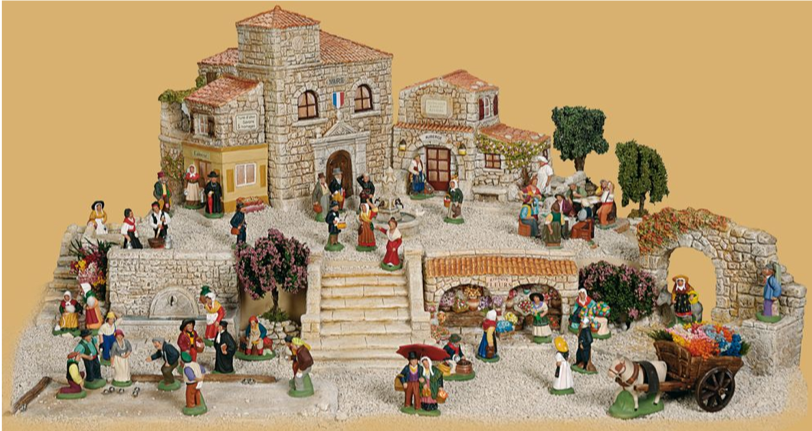
5 Words To Know If You’re Spending The Holidays in France This Year
Traveling to France during les fêtes de fin d'années? Add these words to your vocab to celebrate along with the Frenchiest of Frenchies.
By Brian Alcamo
Joyeuses Fêtes, tout le monde! If you’re in France this year for les fêtes de fin d'années, which take place during the month of December and the beginning of January, add these words to your vocabulary to make sure that you can celebrate along with the Frenchiest of Frenchies.
Le Marché de Noël
New Yorkers might be impressed enough by the Christmas markets at Bryant Park and Union Square, but if you’re looking to be blown away, you must go to Strasbourg for their Marche de Noel (Christmas market). The market is so massive that the city has dubbed itself the “Capital of Christmas” according to its website. The official name for the market is Christkindelsmärik, which is tied to this border city’s German heritage.
La Bûche de Noël
(A more “loggy” buche de noel)
This is a French Yule log cake, and it’s absolument delicieuse. Also known as a gâteau de Noël or a gateau roulé, this cake is prepared with a sponge cake that is iced and then rolled into a cylinder before being iced once again. Some people like to decorate their cakes in a Christmassy fashion, while others are intent on making sure you understand that this cake was inspired by a log. Either way, be sure to get your hands on a slice of a bûche de noël anywhere you are in France.
La Crèche
This word means “Nativity Scene,” and most in French are very typical, with Mary and Joseph holding court in a nondescript manger with Jesus. However, a creche provencale is a little different. It transposes the story of the nativity onto a southern French village. Little figurines, or santons, carry provencale essentials, like lavender and rosemary (yes, I said essentials).
Les Papillotes
While the word papillote can be used to denote anything wrapped or cooked in paper, une papillote is a special holiday treat wrapped in a metallic foil, which typically contains a message. The papillote’s origin story is that sometime during the 18th century, a Lyonnaise candy maker created small treats so that he could send little love messages to the girl in the village that he was smitten with. Now, the candies are simply cute and edible holiday decorations.
Le réveillon du jour de l’an
It’s New Years’ Eve! Like most places in the world, France turns out for the last party of the year. A few hours before this, though, the President address the French people on television, discussing the current political climate and his vows for the new year. If you’re looking for fireworks on this special night, please note that Paris does not put on any of these cherished feu d’artifice on New Years’ Eve. Fireworks along the Champs Elysees used to be part of the New Years’ tradition there, but in recent years have stopped. This lack of fireworks should not deter you from running out into the street at midnight to shout your heartiest bonne annee!
Also: You might also hear this day called Le réveillon de La Saint Sylvestre (Saint Sylvestre is another way to say New Years’ Day in France).
We hope you enjoy your holiday season wherever you are. If you’re in France, be sure to keep an eye out for these cultural traditions!
Thumbnail Image Credit: Alicia Steels
Learn French at the Gym
The best French verbs to keep you motivated while working out.
While being physically active, try infusing these French verbs into your repetitive movements. It is the perfect time to infuse language learning as your brain is more expansive and cohesive during physical activity. In fact, there are a number of studies that prove the benefits of infused learning & physical active being combined together. So next time you grab your bright blue yoga mat, keep the following in mind and repeat, repeat, repeat. Namaste.
STEP 1: Getting To The Gym
We all know that one of the hardest parts of going to the gym is actually getting outside of our daily routines and repeatedly going. What you may not have thought of is that French could be the motivator to get you there! By infusing French into your gym workout, you can 'kill two birds with one stone' and learn a new language while being active. Try looking at the thoughts below and practice the French verbs every morning before your next session:
Thought #1 "I'm too tired to go to the gym"
While this may be true if you are like most New Yorkers who work 14-hours a day, any French person knows that being 'too tired' is not an excuse for avoiding staying slim and healthy. Thus, let's turn this frown-up-side-down with the verb 'must.' For example, I must go to the gym. Period. No excuses, just straight forward French thinking. The verb 'Must' in French is 'Droit.' Below is the conjugation of this verb along simple sentences to practice using it. Try saying the verb out loud, along with the audio recording below:
Je dois aller au sport. (I must go to the gym.)
Tu dois aller au sport. (You must go to the gym.)
Il/elle doit aller au sport. (He/She must go to the gym.)
Nous devons aller au sport / on doit aller au sport. (We must go to the gym.)
Vous devez aller au sport. (You (plural) must go to the gym.)
Ils /elles doivent aller au sport. (They must go to the gym.)
Let's continue to use this verb in a new way of thinking. For example 'I must get stronger,' 'I must lose weight,' 'I must stay active & healthy.' Take a look at these sentences below using the same conjunctions from above and practice them utilizing the audio recordings as a guide.
Thought #2: "I must get stronger"
Je dois devenir plus fort. (I must get stronger.)
Tu dois devenir plus fort. (You mush get stronger.)
Il/elle doit devenir plus fort(e). (He/She must get stronger.)
Nous devons devenir plus fort/On doit devenir plus fort. (We must get stronger.)
Vous devez devenir plus fort(e)s. (You (plural) must get stronger.)
Ils/elles doivent devenir plus fort(e)s. (They must get stronger.)
Thought #3: "I must lose weight"
Je dois perdre du poids. (I must lose weight.)
Tu dois perdre du poids. (You must lose weight.)
Il/elle doit perdre du poids. (He/She must lose weight.)
Nous devons perdre du poids. (We must lose weight.)
Vous devez perdre du poids. (You (plural) must lose weight.)
Ils/elles doivent perdre du poids. (They must lose weight.)
Thought #4: "I must stay active & healthy"
Je dois rester actif/active et en bonne santé. (I must stay active & healthy.)
Tu dois rester actif/active et en bonne santé. (You must stay active & healthy.)
Il/elle doit rester actif/active et en bonne santé. (He/She must stay active & healthy.)
Nous devons rester actifs/actives et en bonne santé / On doit rester actifs/actives et en bonne santé. (We must stay active & healthy.)
Vous devez rester actif/active et en bonne santé. (You (plural) must stay active & healthy.)
Ils/Elles doivent rester actifs/actives et en bonne santé. (They must stay active & healthy.)
STEP 2: YOU made it to THE GYM
Amazing! Now that you have forced yourself to go to the gym with the verb 'Droit,' let's kick it into high gear with some physical motions you might actually use while there like 'To Run,' 'To Lift' (weights), 'To Sweat,' and 'To Stretch.' To keep things simple, we will speak in the present tense and will use the same sentence for each verb for practice. Try memorizing the conjugations for each verb by saying them out loud using the sentences below. When you are at the gym in real life, say these sentences to yourself as practice. Ready, Set, GO!
Je cours. (I am running.)
Tu cours. (You are running.)
Il/Elle court. (He/She is running.)
Nous courons / On court. (We are running.)
Vous courez. (You (plural) are running.)
Ils /elles courent. (They are running.)
Je pousse des poids. (I am lifting weights.)
Tu pousses des poids. (You are lifting weights.)
Il /Elle pousse des poids. (He/She is lifting weights.)
Nous poussons des poids / On pousse des poids. (We are lifting weights.)
Vous poussez des poids. (You (plural) are lifting weights.)
Ils / Elles poussent des poids. (They are lifting weights.)
Je transpire. (I am sweating.)
Tu transpires. (You are sweating.)
Il/Elle transpire. (He/She is sweating.)
Nous transpirons / On transpire. (We are sweating.)
Vous transpirez. (You (plural) are sweating.)
Ils /Elles transpirent. (They are sweating.)
Je m'étire. (I am stretching.)
Tu t'étires. (You are stretching)
Il /Elle S'étire. (He/She is stretching.)
Nous nous étirons / On s'étire. (We are stretching.)
Vous vous étirez. (You (plural) are stretching.)
Ils/Elles s'étirent. (They are stretching.)
STEP 3: you had a great workout
Now that you made it through an amazing workout, you are feeling proud and happy for the healthy decisions you made. At this point you are ready for a quick shower and to head back home/apartment for a relaxing moment and possibly even a snack. Some congratulatory phrases you use to reward yourself are "I did it!" and "I am the best!" From these phrases come the verbs "To Do," and "To Be." Take a look at them below and use the audio to practice each sentence. Next time you complete a workout, make sure to say these positive phrases to yourself for all of your handwork. Heck, just for making it all the way through this article, you should say them all to yourself after practicing a few times through. Keep up the good work!
J'ai réussi! (I did it!)
Tu as réussi! (You did it!)
Il /Elle a réussi! (He/She did it!)
Nous avons réussi! / On a réussi! (We did it!)
Vous avez réussi! (You (plural) did it!)
Ils / Elles ont réussi! (They did it!)
Je suis le/la meilleur(e)! (I am the best!)
Tu es le/la meilleur(e)! (You are the best!)
Il /Elle est le/la meilleur(e)! (He/She is the best!)
Nous sommes les meilleur(e)s! / On est les meilleur(es)! (We are the best!)
Vous êtes les meilleur(e)s! (You (plural) are the best!)
Ils /Elles sont les meilleur(e)s! (They are the best!)
Congratulations on all of your handwork! You made it through the Learn French at the Gym. Just like physical activity, you need to continue to excise your brain. By incorporation these exercises into your workout routine, you'll be expanding your French knowledge in a great way. Do your best to memorize these verbs and say them over and over while doing different activities. You will thank yourself next time you travel to France! For more tips and useful French instruction or to register for Private Lessons or Group Classes, visit the JP Linguistics website HERE!








